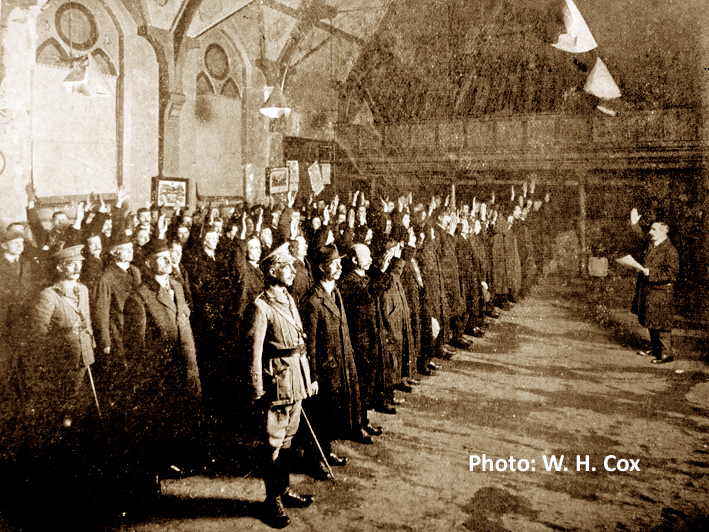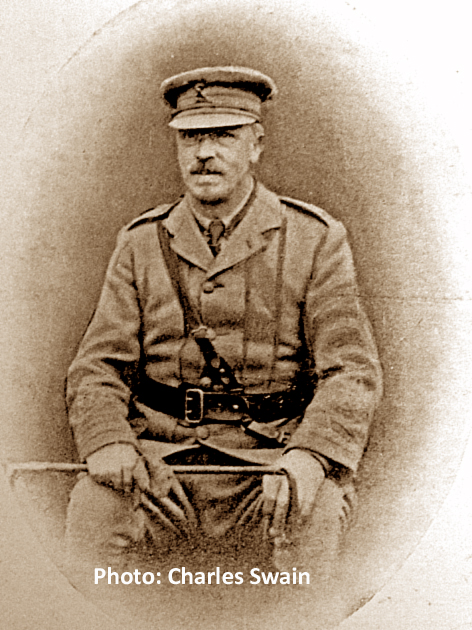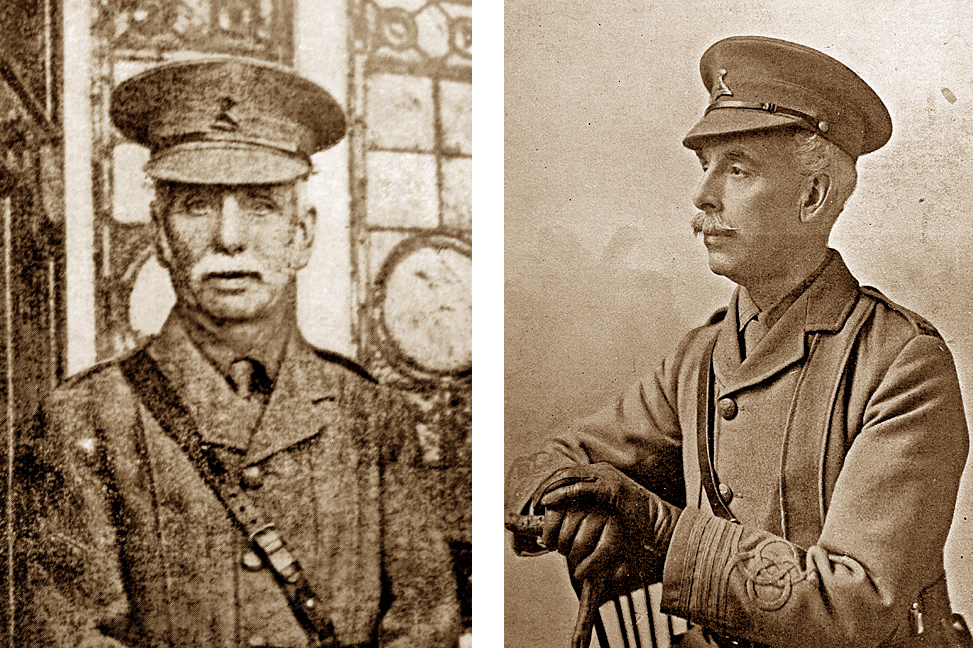
- 2nd Volunteer Battalion men taking their oath at the Corn Exchange in 1916.
To the number of about 130, men of 'C' Company, 2nd Volunteer Battalion Beds Regiment, gathered at the Town Hall, Luton, on Thursday evening [February 27th]. The event was a complete success, and provided an opportunity for a welcome reunion of past and present members, reported the Beds & Herts Saturday Telegraph of March 1st, 1919.
Interesting references were made during the proceedings to the future of the Force, as well as to its development in the past, and the speeches throughout were of a high standard.
 Capt P. G. Gladwell (Company Commander) was in the chair, and the officers immediately supporting him were Battalion Commanding Officer Major H. Cumberland Brown (pictured right), Capt H. Inwards (Second-in-Command), Capt and Adjutant W. D. Moreton, Capt G. A. Fyson (Assistant Adjutant), Lieut and Quartermaster A. T. Buckley, Lieut H. Gardner, Lieut J. W. Adams, Lieut A. E. H. Gates, Lieut H. J. Hinds, Lieut R. H. Durler, Sec-Lieut O. W. Impey and Sec-Lieut O. W. Sinfield. Also present at the top table was Mr E. T. Broadbent, who held the rank of Platoon Commander in the early days of the Volunteer Training Corps movement.
Capt P. G. Gladwell (Company Commander) was in the chair, and the officers immediately supporting him were Battalion Commanding Officer Major H. Cumberland Brown (pictured right), Capt H. Inwards (Second-in-Command), Capt and Adjutant W. D. Moreton, Capt G. A. Fyson (Assistant Adjutant), Lieut and Quartermaster A. T. Buckley, Lieut H. Gardner, Lieut J. W. Adams, Lieut A. E. H. Gates, Lieut H. J. Hinds, Lieut R. H. Durler, Sec-Lieut O. W. Impey and Sec-Lieut O. W. Sinfield. Also present at the top table was Mr E. T. Broadbent, who held the rank of Platoon Commander in the early days of the Volunteer Training Corps movement.
The menu was: Mock turtle soup; fillet of plaice, lobster sauce; roast beef, legs of mutton; macedoine of fruit, vanilla cream, port wine jelly, mince pies; cheese, biscuits, celery; dessert fruit; coffee.
The loyal toast was proposed from the chair with regimental brevity - “Gentlemen. The King”. Capt Inwards led the singing of the National Anthem.
Lieut Gates submitted 'The Army, Navy and Auxiliary Forces' and said he should ask the company to treat it as an act of honour and homage to the men of the great services. He knew of no men more worthy of homage than those of our indomitable Army and our incomparable Navy.
President Wilson, said the speaker, had stated that America won the war. His own view was that the war was won by the men of the First Hundred Thousand.
During the war rich and poor, high and low, had rubbed shoulders and had learned to know each other better. They had developed a great spirit of comradeship and camaraderie; and the speaker suggested that if this could be transferred to the conduct of civil affairs, the clouds which at present obscured the horizon at home would be dispelled and the nation would pull safely through to the happier days which awaited us.
Proposing a toast to 'The C.O. And Senior Officers,' Capt Gladwell said every man in the Battalion had a most affectionate regard for Major Cumberland Brown, the Commanding Officer. He had all the qualities – strong character and personality, quick decision, grasp of detail, and military efficiency – which marked him at once as a soldier and a leader.
The C.O., said the speaker, never forgot the welfare of his men; and on a route march of during a long day, he always remembers that though A1 in heart they possibly were a grade lower in physical capacity and endurance. His was a popularity which had not faded with the test of time; it had been maintained with the formation of the Battalion.
And in the days to come – when bayonets were beaten into allotment tools; when the children were asking awkward questions as to 'what Daddy did,' and when the men could no longer say as they left home, 'I'm going to the Armoury to clean by rifle,' - with the recollection of their old Volunteering times and experiences would be associated the memory of Major Cumberland Brown.
Of Capt Inwards (pictured below, right), the second in command, Capt Gladwell said he was ever genial and bright, ever willing and able to help his brother officers. He had also become a veritable encyclopedia of useful knowledge.
“We know what he has done for Volunteering in this town; we know that his eloquence stirred the imagination and the patriotism of his fellow citizens. He it was who led us through the wilderness when we were despised and rejected of our Government, and to him be the glory and praise of the birth of this Battalion.”

Capt Fyson (pictured above, left), said the speaker, was, as they all knew, an old campaigner; he was discharging important Volunteer duty when many of the Company were yet children. In the early days of the present Force he as the chief instructor of that faithful band of followers, and his reward was in the standard of efficiency and measure of success since achieved.
Major Cumberland Brown, in dealing with the future of the Force, quoted from a letter addressed to Lords Lieutenants by the Army Council, including the following passages:
“The original purposes for which the Volunteer Force was raised were to provide additional protection to this country from outside attack and to replace full-time troops in the performance of certain temporary services. Owing to the altered military situation those purposes have lost some of their urgency...
“A period of suspense is therefore imposed, during which the Council have no intention of breaking up and organisation which by hard work and keen public spirit has achieved a considerable degree of military efficiency.
“Although obligatory training and further enrolments have been temporarily suspended, it is intended to keep the Force in being, pending the final decision as to its disposal...
“Meanwhile, as an immediate mark of appreciation of their services, the Army Council have decided, under conditions to be laid down, that after the ratification of the terms of peace, Volunteer officers shall be allowed to retain honorary rank on retirement and the right to wear uniform on special occasions, and that other ranks of the Force shall be permitted to retain their uniform (ie service dress, cap, puttees and regimental badges).
“The question of any further recognition of the valuable services rendered by the Force will remain for later consideration.”
Following other toasts and responses, a most enjoyable musical programme was provided, and the National Anthem concluded the successful function at midnight.
On Wednesday, March 5th, a similar dinner was held at the Town Hall for about 100 men of 'B' Company of the Volunteer Battalion. A dinner for 140 men of 'A' Company had been held at the Town Hall on January 29th.

